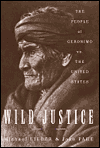All books / Book
Wild Justice:: The People of Geronimo vs. the Untited States

| Full title: | Wild Justice:: The People of Geronimo vs. the Untited States |
|---|---|
| ISBN: | 9780679451839 |
| ISBN 10: | 0679451838 |
| Authors: | Page, Jake |
| Publisher: | Random House |
| Edition: | 1 |
| Num. pages: | 318 |
| Binding: | Hardcover |
| Language: | en |
| Published on: | 1997 |
Read the reviews and/or buy it on Amazon.com
Synopsis
In The Long, Anguished History Of The American Indian, The Events Comprising The Resistance Of The Chiricahua Apaches Against European Encroachment And Their Subsequent Punishment At The Hands Of The United States Were The Most Heroic, Violent, Expensive ... And Tragic. As Settlers Swarmed Into The Southwest, The Apaches Were Forced Off Their Ancestral Lands. Led By The Infamous Warrior Geronimo And Outnumbered By Five Hundred To One, A Small Group Of Renegade Apaches Waged A Fierce Rebellion Against The U.s. Army For More Than A Year. Finally Surrendering In 1886, Geronimo And The Rest Of The Chiricahuas - Including Those Who Didn't Participate In The Insurrection And Even Those Who Actively Assisted The Army - Were Held As Prisoners Of War For Twenty-three Years In Far-off Florida, Alabama, And, Later, Oklahoma. After World War Ii, Congress Felt Obliged To Establish A Forum Specifically To Hear And Remedy The Complaints Of Indian Tribes Against The United States, And, In 1947, Harry S. Truman Signed Into Law The Indian Claims Commission. The Chiricahua Were Represented By An Unlikely Pair Of Lawyers: Israel Weissbrodt, Born To Illiterate Jewish Emigrants From Poland, Educated At Columbia University, And Trained By William O. Douglas; And David Cobb, A Mayflower Descendant And Harvard Graduate. When The Government Misdated The Taking Of The Apache Lands And Left An Opening For Legal Wrangling, This Odd Couple Pounced. The Result Was A $22 Million Settlement, Forty Times What The Tribe Had Asked For - A Spectacular Sum In Total, But, Divided Among Several Thousand Apaches, It Proved Slim Atonement, And It Was At Best A Bittersweet Victory. Rather Than Negotiating The Indian Claims And Considering Present Needs, The United States Insisted On Battling Over Ancient Grievances In The Inherently Adversarial Anglo-american Legal System, Which Was Incapable Of Grasping The Indians' Way Of Life. The Very Concept Of Land Ownership Was Foreign To The Indians, But Payment To The Tribes For Loss Of Acreage Was All The Legal System Could Muster In Recompense For Decades Of Injustice. The Destruction Of Religion, Tribal Sovereignty, And Whole Cultures Remained Unaddressed, And These Issues Plague U.s./indian Affairs To This Day. Introduction -- Wild Justice -- Imprisonment -- A Tribunal For Indian Claims -- Promised Lands -- The Commission Becomes A Court -- The Fall And Rise Of The Imprisonment Claim -- Land Claims: Fiction With A Purpose -- An Eleven-million-dollar Mistake -- The Return Of The Natives -- The Death Of Fairness And Honor -- Accounting For Reservation Management -- Distribution Of The Awards -- An End To Wild Justice -- Locations Of Unpublished Materials Michael Lieder And Jake Page. Includes Bibliographical References (p. [275]-304) And Index.